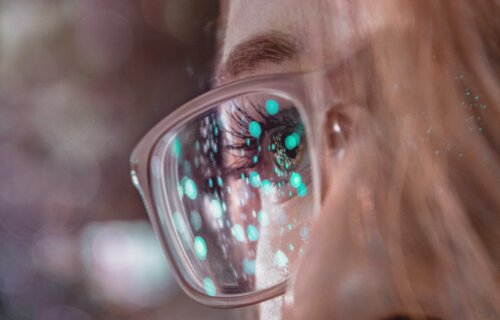MELBOURNE, Australia — Blue-light filtering glasses may not be as effective as marketed, according to new research. These glasses, designed to filter out blue light, seem to have no significant impact when it comes to preventing eye strain or improving sleep quality after using computers.
Since the early 2000s, blue-light filtering or blocking glasses have gained popularity, often recommended or prescribed by optometrists. None of the earlier studies provided evidence that blue-light filtering lenses protect against retinal damage — the light-sensitive tissue at the back of the eye. Notably, this specific outcome wasn’t evaluated in the studies reviewed.
The new research was a collaboration between scientists at the University of Melbourne, City University in London, and Monash University in Australia.
Their goal was to evaluate the effects of blue-light filtering lenses against their non-filtering counterparts in terms of visual performance, retina protection, and sleep quality improvement. The 17 trials spanned six countries, with individual study participants ranging from five to 156, and assessment periods from less than a day to five weeks.
“We found there may be no short-term advantages with using blue-light filtering spectacle lenses to reduce visual fatigue associated with computer use, compared to non-blue-light filtering lenses,” says Professor Laura Downie, the study’s senior author, in a media release. “It is also currently unclear whether these lenses affect vision quality or sleep-related outcomes, and no conclusions could be drawn about any potential effects on retinal health in the longer term. People should be aware of these findings when deciding whether to purchase these spectacles.”

Downie also highlighted the importance of considering the quality and duration of these studies.
The researchers emphasize the need for “high-quality, extensive clinical research with longer follow-up periods and more diverse populations. Such studies should further investigate the potential effects of these lenses on visual performance, sleep, and eye health.”
Interestingly, the review did not consistently find adverse side-effects from wearing blue-light filtering glasses. Any reported effects, such as discomfort, headaches, or mood changes, were mild and short-lived. These effects were attributed more to wearing glasses in general since similar issues arose with non-filtering lenses.
“Over the past few years, there has been substantial debate about whether blue-light filtering spectacle lenses have merit in ophthalmic practice. Research has shown that these lenses are frequently prescribed to patients in many parts of the world, and a range of marketing claims exist about their potential benefits, including that they may reduce eye strain associated with digital device use, improve sleep quality and protect the retina from light-induced damage,” says Prof. Downie. “The outcomes of our review, based on the current, best available evidence, show that the evidence is inconclusive and uncertain for these claims.”
The increased use of modern digital devices, which emit more blue light than traditional light sources and are often used closer to bedtime, is a significant basis for the marketing of blue-light filtering glasses.
“The amount of blue light our eyes receive from artificial sources, such as computer screens, is about a thousandth of what we get from natural daylight. It’s also worth bearing in mind that blue-light filtering lenses typically filter out about 10-25% of blue light,” notes Dr. Sumeer Singh, a postdoctoral research fellow in the Downie Laboratory. “Filtering out higher levels of blue light would require the lenses to have an obvious amber tint, which would have a substantial effect on color perception.”
The study is published in the journal Cochrane Database of Systematic Reviews.
South West News Service writer Stephen Beech contributed to this report.

